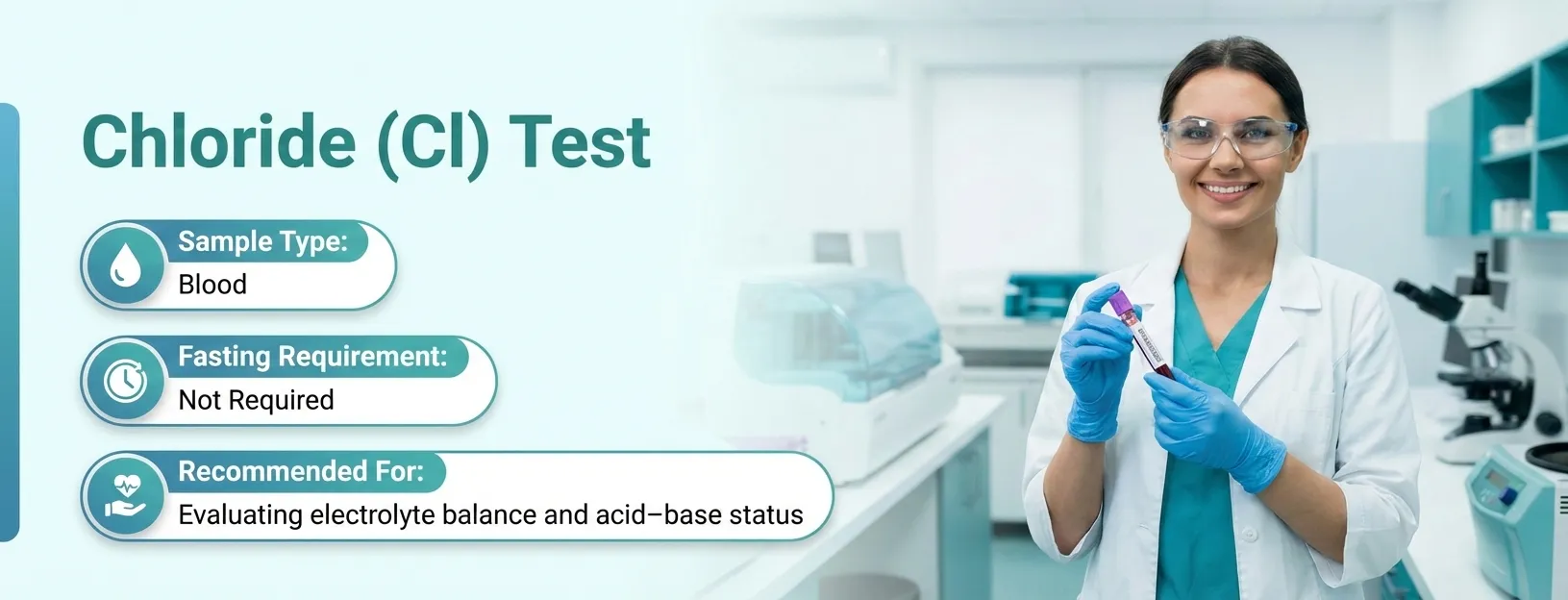219+ orders placed in your location
100% NABL & ISO Certified Lab • 100% Accurate Reports
Chloride (Cl) Test
Serum Chloride Test, Cl Test
- SummaryThe Chloride test measures the level of chloride, an essential electrolyte that helps maintain the body’s acid-base balance, fluid levels, and nerve function. It is often part of an electrolyte panel used to evaluate conditions like dehydration, kidney disease, or metabolic imbalances. The test is performed using a blood sample, and fasting is not required unless done with other tests.Read more
- Reports Within8 HrsView Sample Report100% NABL & ISO Certified Labs
- SampleBlood
- AgeAll Age Group
- GenderMale and Female
- FastingNot Required
PharmEasy Promises
Know More About The Test
A quick info on Chloride (Cl) Test
Overview
Chloride is a type of electrolyte required by your body for proper functioning. Electrolytes are electrically charged minerals to help control the fluid balance and acid-base balance in your body.
Chloride is a negatively charged ion, which forms an important part of your body’s essential electrolytes. The four electrolytes sodium, potassium, bicarbonate and chloride work together to regulate the fluid balance in your body and maintain the acid-base balance. Chloride levels are usually measured along with other electrolytes in the body like sodium, potassium and bicarbonate to diagnose your medical condition or track the prognosis of your illness.
When your chloride levels drop, you may become sick and dehydrated. If your chloride levels go higher, your kidneys may not be functioning adequately. The diseases related to levels of chloride include kidney disease, high blood pressure and liver disease.
Chloride is present in all body fluids. This electrolyte is present in the highest concentrations in blood and in the fluid outside your body’s cells. Sodium and chloride go hand-in-hand and often mimic each other’s concentrations in the blood. Both these electrolytes increase and decrease due to similar causes. Chloride helps maintain electrical neutrality at the cellular level by in and out of the cells whenever needed.
Chloride is consumed through your daily diet and table salt. Most of the chloride from the food gets absorbed in the digestive tract and the excess of chloride is eliminated in urine. The blood levels of chloride usually remain steady, with a slight decrease in the levels after meals. This is because your stomach produces acids after you eat and uses the chloride from the blood.
The Chloride Test measures the levels of chloride in the blood and occasionally urine as well. It is often measured along with other electrolytes when you need to get a full blood workup of all your electrolytes.
The Chloride Test is used for the diagnosis of the causes of the signs and symptoms like diarrhoea, prolonged vomiting, weakness, fatigue and difficulty in breathing. If your doctor suspects an electrolyte imbalance, then you may be advised a series of electrolyte tests to diagnose and monitor your condition.
If your doctor suspects an acid-base imbalance, then you may be advised a series of tests for blood gases to diagnose and monitor the cause of the imbalance. The Chloride Test is also done when there may be suspected acidosis or alkalosis.
Studies show that electrolyte imbalance is markedly present in patients with uncontrolled blood sugar levels or diabetes. Therefore, the Chloride Test helps as a predictor and should be routinely measured in people with type 2 diabetes mellitus.
Risk Assessment
Electrolyte imbalance, Acid-base imbalance
What does this Test Detect?
The Chloride Test measures the level of chloride in your blood. The Chloride Test helps measure chloride to diagnose conditions of the liver and kidneys based on these signs.
Indications for Chloride Test
The Chloride Test can be prescribed for all age groups and genders. This test is prescribed in the following cases:
- Symptoms of an acid-base imbalance - If you are experiencing any of the following symptoms, your doctor may advise you to get the Chloride Test done.
- Fatigue
- Vomiting
- Diarrhoea
- Weakness
- Dehydration
- Breathing difficulty
- Monitor chronic conditions -If you have any of the following medical conditions, your doctor may advise the Chloride Test along with the electrolyte panel and blood gas panel.
- Heart diseases
- Kidney disorders
- High blood pressure (Hypertension)
- Diabetes
- High cholesterol levels (Dyslipidaemia)
- Liver disorders
- Nutritional issues
How Frequently should you take this Test?
Based on your diagnosis and symptoms, your doctor may repeat the Chloride Test as follows:
- If you have a chronic (long-term) condition like liver disease or kidney disease, the Chloride Test is repeated every 3-6 months/ as advised by your doctor.
- If you have an acute (severe) liver or kidney condition, then the Chloride Test may need to be repeated every other day to keep track of your illness.
Regular monitoring and testing allow your doctor to check the prognosis of your disease and how you are responding to the treatment. In addition, follow-up tests of the Chloride Test help provide detailed information about the severity of the disease and how the disease has progressed over time.
Test Preparation
The Chloride Test takes a sample of your blood for testing. It does not require any special preparation. However, if you are getting other blood tests done along with the Chloride Test, you may need not eat or drink anything for 10-12 hours based on the tests.
Before the Test
This test does not require any preparation from your end. First, inform your physician about any medicines that you may be taking. Medications like cortisone, oestrogen, ammonium chloride and NSAIDs like ibuprofen, naproxen, etc., are known to increase chloride levels. You may have to stop taking these medicines before getting the test done or your doctor will interpret the results accordingly.
During the Test
It is a simple blood test that will get over in 5-10 minutes. You do not need to prepare for the test in any way.
After the Test
There are no restrictions after the Chloride Test. Therefore, you can resume regular activity after the test.
Parameters
The parameters included in the Chloride Test are the measures of the chloride levels in the blood. When you get the test done as part of your kidney function tests, it will consist of other values like electrolytes like sodium, potassium and bicarbonate, along with chloride levels.
Ranges
The Chloride Test results are usually reported in milliequivalents per litre (mEq/L) or millimoles per litre (mmol/L). If you have gotten the entire metabolic panel of tests done, you will get the reports of all parameters.
The Chloride Test results give you a report of the abnormal levels of chloride in the blood.
Age Group | Normal Range (mEq/L or mmol/L) |
Adult | 98 - 107 mEq/L or 98 - 107 mmol/L |
> 90 years | 98 - 111 mEq/L or 98 - 111 mmol/L |
The normal values and reference ranges of the test may vary from lab to lab. Please refer to the ranges mentioned in the report and consult a doctor to understand the interpretation of lab reports.
Test Result Interpretation
Low chloride levels may lead to hypochloraemia. This is caused due to:
- Heart failure
- Lung diseases
- Addison’s disease - a condition in which your body’s adrenal glands do not produce enough of a specific type of hormone. This can cause weakness, dizziness, weight loss and dehydration.
- Diabetic ketoacidosis
- Aldosterone deficiency
- Metabolic alkalosis - a condition where you have too much base in your body that can cause muscle twitching, irritability and tingling in your fingers and toes.
- Prolonged vomiting or gastric suction
- Cushing syndrome - a condition where you have increased cortisol levels in your body that can cause weight gain, stretch marks on the skin, easy bruising on the skin, slow wound healing and acne.
- Malabsorption syndrome
High chloride levels can lead to hyperchloraemia. This is caused due to:
- Severe dehydration leads to loss of fluids in the body.
- Kidney diseases that result in electrolyte imbalance.
- Cushing syndrome - a condition where you have increased cortisol levels in your body that can cause weight gain, stretch marks on the skin, easy bruising on the skin, slow wound healing and acne.
- Metabolic acidosis - a condition where you have too much acid in your blood that can cause nausea, vomiting and fatigue.
- Metabolic alkalosis - a condition where you have too much base in your body that can cause muscle twitching, irritability and tingling in your fingers and toes.
- Chemotherapy leads to increased vomiting and dehydration, resulting in fluid loss and damage to the kidneys.
High levels of chloride are also caused due to the following medicines:
- Cortisone
- Oestrogen
- NSAIDs like ibuprofen, naproxen - medicines used to reduce inflammation
- Ammonium chloride
- Diuretics - medicines used to increase urine production
- Laxatives - medicines used to ease constipation and induce diarrhoea
The Chloride Test results may be inaccurate in the following cases -
- Drinking too much water
- Receiving a large number of intravenous fluids
- Loss of fluids due to excessive diarrhoea or vomiting
Based on your Chloride Test results, the doctor may require some other tests from the metabolic panel to confirm the clinical diagnosis.
Risk and Limitations
The Chloride test is a standard blood test that is generally safe and does not commonly result in complications. However, kindly contact your physician immediately if you encounter:
- Persistent bleeding from the needle insertion site.
- Pain or swelling at the site of blood collection.
Limitations of the test
- Possibility of errors caused by equipment or human factors.
- Risk of misinterpretation of the test markers.
Was This Test Information Helpful?
Please rate your experience
References
Health packages containing 'Chloride (Cl) Test'
People Also Ask
What causes low chloride in the body?
What is a normal chloride test?
What does a chloride level of 110 mean?
What foods are high in chloride?
Can you consume too much chloride?
Have any doubts? Ask us.
Ask us anything about the Chloride (Cl) Test to understand it better
We provide trusted, expert-curated health content to support better awareness,prevention, and care.
Backed by experienced doctors, medical experts, and strict editorial standards.

